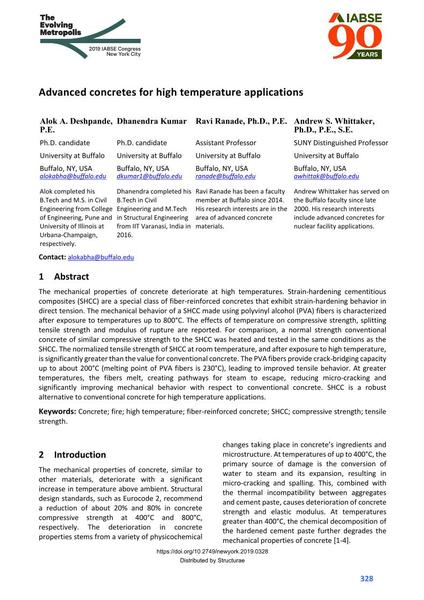Advanced concretes for high temperature applications

|
|
|||||||||||
Bibliographic Details
| Author(s): |
Alok A. Deshpande
Dhanendra Kumar (University at Buffalo) Ravi Ranade Andrew S. Whittaker |
||||
|---|---|---|---|---|---|
| Medium: | conference paper | ||||
| Language(s): | English | ||||
| Conference: | IABSE Congress: The Evolving Metropolis, New York, NY, USA, 4-6 September 2019 | ||||
| Published in: | The Evolving Metropolis | ||||
|
|||||
| Page(s): | 328-332 | ||||
| Total no. of pages: | 5 | ||||
| DOI: | 10.2749/newyork.2019.0328 | ||||
| Abstract: |
The mechanical properties of concrete deteriorate at high temperatures. Strain-hardening cementitious composites (SHCC) are a special class of fiber-reinforced concretes that exhibit strain-hardening behavior in direct tension. The mechanical behavior of a SHCC made using polyvinyl alcohol (PVA) fibers is characterized after exposure to temperatures up to 800°C. The effects of temperature on compressive strength, splitting tensile strength and modulus of rupture are reported. For comparison, a normal strength conventional concrete of similar compressive strength to the SHCC was heated and tested in the same conditions as the SHCC. The normalized tensile strength of SHCC at room temperature, and after exposure to high temperature, is significantly greater than the value for conventional concrete. The PVA fibers provide crack-bridging capacity up to about 200°C (melting point of PVA fibers is 230°C), leading to improved tensile behavior. At greater temperatures, the fibers melt, creating pathways for steam to escape, reducing micro-cracking and significantly improving mechanical behavior with respect to conventional concrete. SHCC is a robust alternative to conventional concrete for high temperature applications. |
||||
| Keywords: |
concrete fiber-reinforced concrete tensile strength compressive strength high temperature fire SHCC
|
||||
